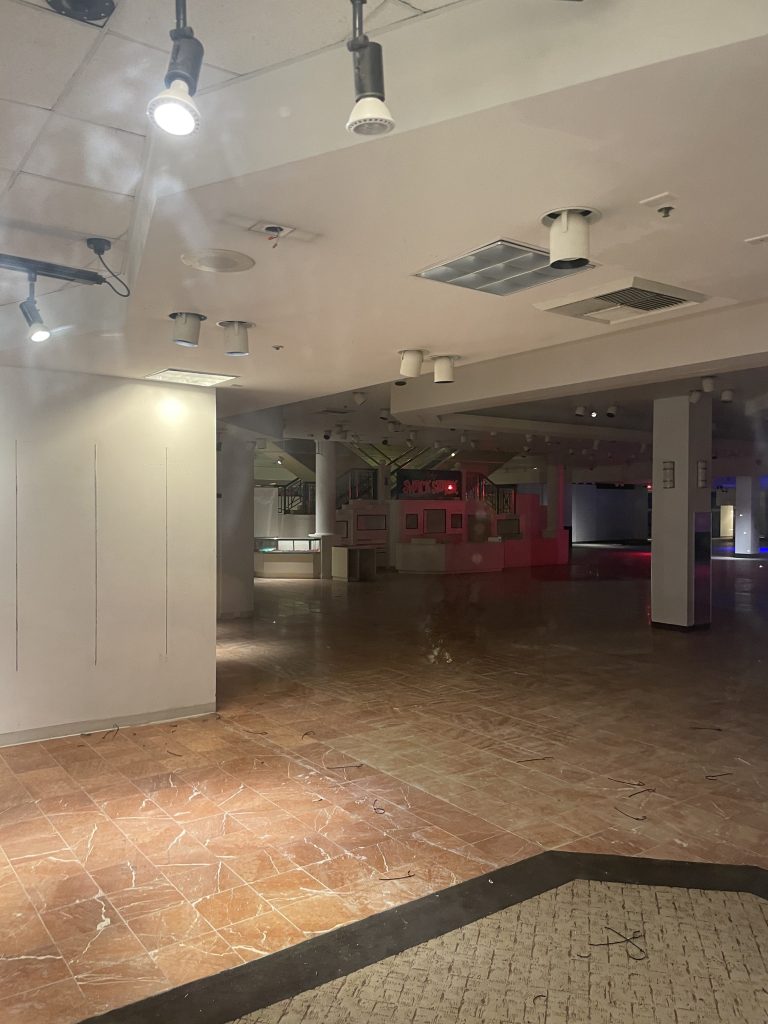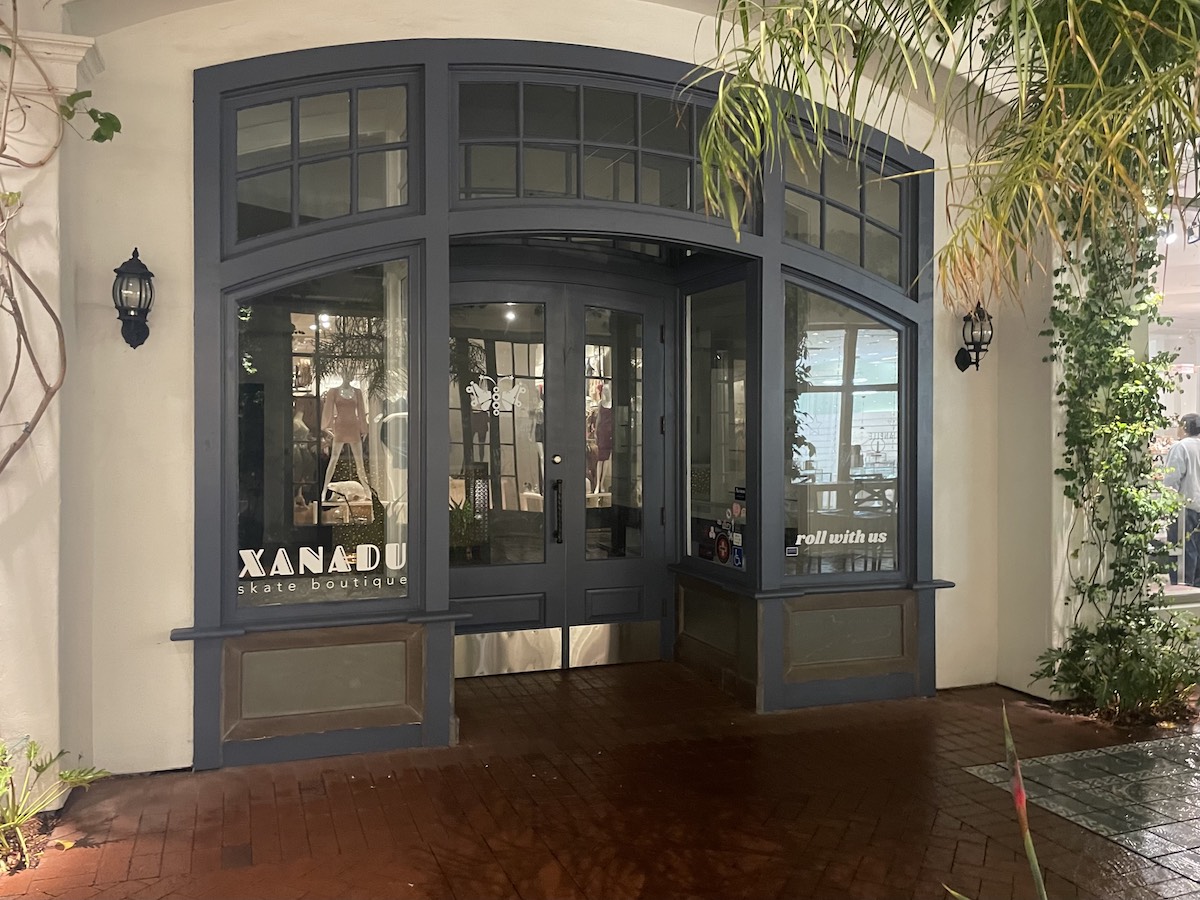After opening in July, Santa Barbara business owner Val Selvaggio was shocked when she got the email on August 31 that her store’s lease in Paseo Nuevo mall had been terminated. Her shop, Xanadu Skate Boutique, had only been open for five weeks.
“They gave me a 60-day notice,” Selvaggio said. She explained that the notice was in accordance with a clause in her lease agreement, but she did not expect for her time in Paseo to end so soon.
“The reason was that they supposedly found another renter that wanted a permanent deal there, and it was going to pay almost three times the amount of what I paid, and that was never offered to me,” she said. “I basically got kicked out.”
Before moving to her new location at 11 W Canon Perdido Street, Selvaggio said, “Paseo did at least offer [her] another space,” but it was too big, and it had carpeting. She explained that carpet wouldn’t make sense in a store that sells roller skates, so she asked Paseo’s owners if they “could at least tear out the carpet” for her.
“They refused to do that,” she continued. “It was like, you pulled the rug out from under me, and now that literally I’m asking you to, you don’t. It was just frustrating.”
Selvaggio’s roller skate boutique met a similar fate as Aloha Fun Center, the roller rink that was planned to open on the ground floor of the former Macy’s building. Both projects in the Paseo Nuevo mall met their end before they had even really begun, adding to the confusion and frustration felt by the city and its residents around bringing new vitality to downtown.

Aloha was invited to bring its concept to the empty department store by the mall’s former management. “[Aloha] was part of why I decided to open a roller skate shop,” Selvaggio said. “I mean, I roller skate, and I’m part of the roller skating community here, and there’s never been anywhere to buy all of this stuff.”
With the roller rink opening and Xanadu just a waltz away, Selvaggio said she and Paseo’s leasing manager at the time were excited about the flow of traffic the two businesses would create together.
According to Jason Harris, the city’s economic development manager, Aloha had a short-term lease of just 12 months to use the first floor of the department store, in “as-is condition.” The company had planned for the roller rink to also include food and drink service, an arcade, and laser tag.
Aloha’s owner, however, “did not anticipate that the change of use from a general retail to an assembly use, as defined by the State Building Code, would require changes to the space, in particular the construction of additional restrooms.”
Aloha’s operation would have meant more people crowding just one floor of a space designed to be a multi-story department store. Unfortunately for Aloha, a majority of the building’s bathrooms are on the second floor.
Aloha’s owner, Liz Ruiz, had proposed the use of upscale portable restrooms, but that didn’t fly with Paseo’s owners. The Independent reached out to Ruiz for this story, but she declined to comment.
In addition, Ruiz was waiting on permits from the city, which were not immediately sought out, for other changes to the space. According to Selvaggio, Ruiz had called upon the help of non-local contractors and was expecting the same kind of lax regulations she had dealt with when building the first Aloha location in San Jose. She was unprepared for Santa Barbara’s red tape.
“When you go in to do a change of use, they call it, it triggers all these new codes; it can be fire sprinklers, it can be more bathrooms, and so the costs just go higher and higher,” said Jason Jaeger, a local commercial real estate broker and president of the Santa Barbara Leadership Team. “If you don’t have a long enough lease, to amortize the improvements over, it doesn’t make economic sense. That’s most likely what happened there: … the costs ballooned, and the lease term didn’t substantiate it.”
The roller rink was, otherwise, ready to open. If you peek inside the building, you can still see the remnants of luau-themed decorations and a full-on snack shack. Selvaggio said she had even skated in the space.
“And there’s plenty of space to build bathrooms, but [Ruiz] was just the person renting the space, so she’s not going to put in her money to build permanent bathrooms in a building that she doesn’t own,” Selvaggio continued. “If Paseo was willing to put in the money as an investment to build bathrooms, we would have a roller rink.”
After this story first appeared, Eve Sanford, a former employee of Aloha, reached out to the Independent. Although she initially declined to comment for this story, Sanford said that Aloha was “in the process of permitting and investing in building bathrooms in order to get our rink open to the public,” and that “what actually hindered [them] from moving forward was the new building owners refusing to renew [their] lease, choosing instead to seek higher-paying office tenants.”
The mall has changed ownership, and management, in the time since Aloha started to move in last year. Selvaggio said that the mall’s change of hands caused a lot of confusion for her and Ruiz, especially losing the mall’s previous leasing manager, which was a source of frustration for both business owners.
“It was this limbo phase of, like, ‘Who even owns Paseo?’” Selvaggio said. “Liz was like, ‘I don’t even know who to talk to at this point.’”
When Macy’s vacated, the mall was owned by investment group Pacific Retail Capital Partners, with affiliate Paseo Nuevo Owners LLC, and was under local management. However, Pacific Retail defaulted on its loan in August of this year after falling behind on payments, following its investment of approximately $18 million in renovations to the mall.
Sign up for Indy Today to receive fresh news from Independent.com, in your inbox, every morning.
But, then again, Pacific Retail never really “owned” the land. What it owned was a 42-year leasehold on the land, with no right to extend. The bank foreclosed on the mall since the owners were not making their payments, and the mall’s leases were handed back to their lender.
“Instead of going through this lengthy legal process, the lender did what we call a ‘friendly foreclosure,’ where you basically hand the keys back so it wasn’t this super litigious thing,” Jaeger said.
According to Jason Harris, Paseo Propco LLC — a Delaware limited liability company, which is an affiliate of investment group AB Commercial — now owns the leasehold and is overseeing the mall operations. The company could not be reached for comment.
“AB Commercial has not submitted or released any plans for the former Macy’s building space, but they do have it listed for lease to office users,” Harris said. “Similarly, they have not indicated any future plans for the mall as a whole.”
To the dismay of many Santa Barbara residents, you can’t skate in an office building. Learning that Aloha would not be opening downtown was a great source of disappointment for families and the city’s roller skating community. Selvaggio said some parents were even planning to hold their childrens’ birthday parties there.
“Every person who came into my store who was a local would ask me about Aloha, so I talked about Aloha for months, just every single day, multiple times a day, and the end of every conversation was, ‘Great, we all can’t wait for it to be open,” Selvaggio said. “The city needs it, because there’s nothing for kids and families to do. I mean, the zoo is great. MOXI Museum is great. But it’s like, once you’ve done it, you’ve done it. And it’s great for little kids … I have a teenager. They need something to do here.”
Terrance Brown, co-founder of local roller skating club SB Rollers, said he and other members “had high hopes” of having a location where they could skate every day. The group currently takes over the City College parking lot for their weekly meet-ups, but they only get to use that space on Sundays.
“It was just kind of a downfall for us,” Brown said. “Now that Aloha is no longer a project in the making, our goal is trying to get a permanent, outdoor spot, and that’s going to keep everyone up in spirits.”
Plans for the mall’s future have been under question ever since Macy’s left in 2017. For the Macy’s building in particular, newly dubbed the Ortega Building, Jaeger said that local developers think it is a prime location for a big apartment building with mixed-use retail.
“However, the building footprint, the way it’s laid out, structurally doesn’t lend itself to repositioning it,” he said. “So to start over, it’s going to be really costly, and developers are going to want, instead of a 42-year ground lease … a 99-year ground lease, so they can amortize the costs, and the city is going to have to figure out how to incentivize them.”
Eastdil Secured, the advising company for Paseo’s owners, calls the open property in Paseo Nuevo “The Opportunity.” Eastdil Secured advisors said they could not comment for this story, but in a September presentation, the company wrote that the city and its residents “are extremely sensitive to new developments”; however, it says that “the area is seeing an influx of companies and residents that make new developments a necessity.”
“Paseo Nuevo presents the generational opportunity to enter into the reimagination of a historic local treasure,” the presentation reads. “Whether it be multi-family, office, or other uses allowed by the zoning code, the property is a prime candidate to help meet the growing needs of the city.”
Harris said the city “was also disappointed that [Aloha] did not open.” He explained the city is “constantly seeking out prospective businesses that can add to the diversity of business activity, and also encourages prospective businesses to conduct their due diligence before signing a lease.”
In addition, he said that city staff “meet monthly with local real estate brokers to assist and attract new businesses to the city with a focus on downtown.” They’ve been partnering with different venues and organizations to increase community events and programming downtown, to “broaden the range of activities to a greater mix of residents including families.”
Harris emphasized, too, that the “State Street Master Plan is well underway.” He encourages residents to take the survey through which the city is seeking input from residents on what kinds of activities they would like to occur downtown, and where they should be available.
“People are anxious, and they see the potential there,” Jaeger said. “But there’s red tape and a process that just takes a lot of time and money as well. I live in this town, I have my family in town, and I want to see a safe street that’s fun and vibrant, like it should be. Not to walk down the street kind of thinking, you know, ‘What happened?’”
Support the Santa Barbara Independent through a long-term or a single contribution.





You must be logged in to post a comment.